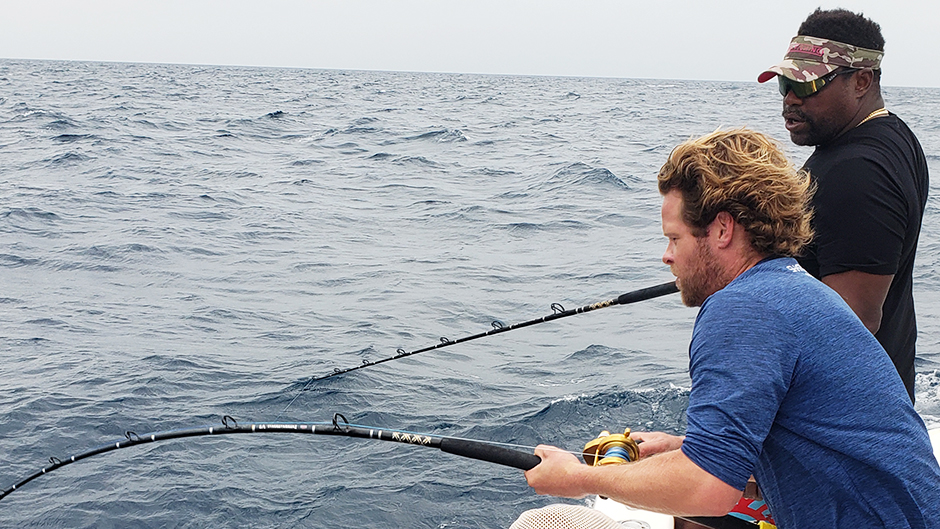When Nathan Garrison was a freshman at the University of Miami, a close friend was attacked and injured by a bull shark in the waters off Folly Beach, South Carolina. For Garrison, who grew up in nearby Charleston, his friend’s experience added an unwelcome new dimension to how he thought of the ocean.
“I’ve been in and around the ocean my whole life—surfing, swimming, diving, you name it,” Garrison said. “And I never really had a fear of it. I never looked at the ocean as something scary. [This fear] got into the back of my mind, and that irked me.”
Later, after graduation and a brief spell in Thailand teaching English, Garrison settled in Santa Barbara, California, “surfing every minute I could.” Within two years of his move, two people were killed by great white sharks near a surfing spot that Garrison himself frequented.
These tragedies got his attention—and got him thinking.
“At that point, my dad and I started having discussions about [ocean safety],” he said. “Could there be a way to make me a little bit less likely than the person sitting next to me in the water to get attacked, or if I’m out there by myself, could give me something besides just luck to rely on to defend myself?
“We thought if I could create something like that, then maybe we could also help reduce the risk for swimmers, divers, and others who faced the same issue we did.”
Garrison soon came across SharkDefense, a research and development company focused on reducing the unintentional killing of sharks in commercial fishing. The SharkDefense research team included marine biologist and Rosenstiel School of Marine and Atmospheric Science alumnus Patrick Rice, Ph.D. ’08, and their mission is to protect sharks from people, just as Garrison was seeking a solution to protect people from sharks.
SharkDefense had developed technology based on research findings that show sharks can sense electrical fields and suggest that the presence of certain types of magnets can repel many species of sharks. “Sharks are highly evolved predators,” Garrison said. “And they have the ability to detect weak electrical fields—it’s how they hunt; it’s how they navigate. The magnets disrupt that, and make the sharks turn away without actually harming them.”
Garrison and his father founded Sharkbanz, which licensed and secured a patent for the technology, then created a line of wearable magnetic shark deterrents for surfers, swimmers, and divers. Those hit the market in 2015, with a percentage of the company’s profits going toward ocean and shark conservation groups.
Within a year or two, Garrison was deluged with calls and emails from commercial and recreational fishermen who faced a related problem: losing catches to passing sharks, a phenomenon called shark depredation. “Either they eat the whole fish off the line, or they take big chunks,” Garrison said. “In some cases, the sharks are eating more than half of what’s being caught.”
“So, what’s happening is people are catching more fish to make up for [these losses] and reach their catch limit, and the number of fish being taken out of the ocean is much larger than what the regulatory agencies have determined is healthy for that ecosystem. It’s become a huge problem all along the Atlantic and Gulf coasts, and in places like Australia.”
Garrison and his team responded with an updated Sharkbanz device that attaches to fishing lines or other gear and works on the same principles of disrupting the shark’s electromagnetic receptors. According to Garrison, fishing captains who adopted the device report reductions in shark depredation of 80 to 90 percent.
He recently had the opportunity to use the device on a fishing trip with Miami Hurricane football great Warren Sapp, ’94, a fishing and diving enthusiast since his retirement from the National Football League. Sapp was an early adopter of the wearable Sharkbanz after being bitten by a small shark while diving off the Florida Keys.
“He’s gotten really into fishing in his retirement and is quite a skilled fisherman,” Garrison said of Sapp. “He messaged us on Instagram saying his original band was [worn] and asking for a replacement. I reached out to him and told him about the new product we had come out with [for fishing gear].” Sapp and Garrison then made plans to go out on the waters off Jupiter, Florida, where Sapp proved himself equally skilled as a fishing coach.
Garrison and Sapp bonded over their shared alma mater as well. “I met him in the parking lot [before embarking on the fishing trip], and the first thing I did was tell him I went to the U,” Garrison recalled. “He immediately got his ’Canes-branded gear bag from his truck, dumped everything out of it, and said ‘here, it’s yours.’”
They keep in touch—and plan more fishing trips together. And now, like anyone else who loves being in or on the ocean, they can coexist a little more easily with the predators lurking below the surface.
’Cane Biz
Sharkbanz is one of more than 800 businesses around the country owned and operated by University of Miami alumni. Check out the ’Cane Biz directory to find ’Cane-owned businesses and alumni discounts near you. If you want to list your business in the directory, click here to tell us all about it.

